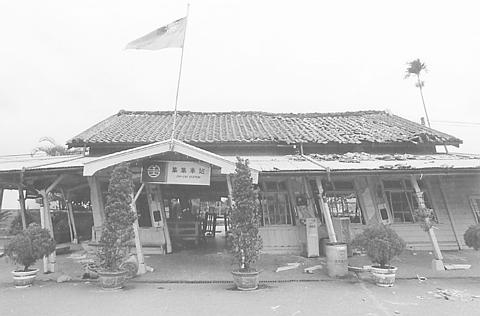The massive 921 earthquake not only claimed the lives of thou-sands of Taiwanese and their homes -- it left dozens of Taiwan's historic sites in ruins.
While an overall inspection of Taiwan's 388 national historic sites is being undertaken by the Ministry of Interior (MOI), some of the sites may unfortunately be gone forever because they were so severely damaged, according to the MOI's Civil Affairs director Chi Chun-chen (紀俊臣).
Among the damaged sites, the 200-year old Lin Family Gardens in Wufeng (

PHOTO: LU CHUN-WEI, LIBERTY TIMES
"Ninety percent of the wooden buildings were destroyed," Chi said, after checking the site with experts.
Ironically, according to Lin Cheng-chi (
The Lin family complex was owned by the wealthiest family in central Taiwan.
The complex, which covered 3,888 square meters, preserved many fine examples of Chinese-style architecture of the Ching dynasty. But the quake two weeks ago demolished nearly the whole area and claimed the lives of two members of the Lin clan.
"All that can be done now is to preserve the wooden relics and antiques left in the debris," Chi said. "We are still considering if we will rebuild the site or abolish it."
According to an initial estimate by the interior ministry, it could take more than NT$100 million to rebuild the complex.
Like the Lin mansion, the Lungshan Temple (龍山寺) in Lukan (鹿港), Chanhua County, was seriously damaged and will require NT$20 million to repair.
In Nantou County, three classical academies -- Mingshin (明新), Tengyen (登簷) and Lantien (藍田) -- were partly collapsed and will also require several millions of dollars for reconstruction, said Chi.
So far, the government has budgeted NT$250 million for emergency repair of damaged historic sites.
However, according to architect Yang Ren-chiang (
At the same time, both legislators and cultural heritage preservation groups urged the government take a closer look at other unregistered historical buildings.
DPP lawmaker Fan Shun-lu (
"As buildings with indicative red tape on them will be demolished within a week under the government's emergency decree, we are worried that those marked historic buildings will also be demolished," said Fan.
Among those buildings, the Chichi Railway Station (集集火車站) -- once a famous tourist spot -- was one of those dangerous buildings, according to Chiu Ru-hua (丘如華) of the Yaoshan Foundation (樂山文教基金會).
In response, Lin Cheng-chi has vowed to save the Chichi station from the wrecking ball.
"We will rebuild the station, and make it a symbol [of inspiration] to help the quake-stricken town stand up again," Lin said.
The Yaoshan Foundation has organized architectural scholars and students to form the League for 921 Reconstruction of Cultural Heritage.
So far, hundreds of professionals have gone to disaster sites for volunteer inspections.

DAREDEVIL: Honnold said it had always been a dream of his to climb Taipei 101, while a Netflix producer said the skyscraper was ‘a real icon of this country’ US climber Alex Honnold yesterday took on Taiwan’s tallest building, becoming the first person to scale Taipei 101 without a rope, harness or safety net. Hundreds of spectators gathered at the base of the 101-story skyscraper to watch Honnold, 40, embark on his daredevil feat, which was also broadcast live on Netflix. Dressed in a red T-shirt and yellow custom-made climbing shoes, Honnold swiftly moved up the southeast face of the glass and steel building. At one point, he stepped onto a platform midway up to wave down at fans and onlookers who were taking photos. People watching from inside

A Vietnamese migrant worker yesterday won NT$12 million (US$379,627) on a Lunar New Year scratch card in Kaohsiung as part of Taiwan Lottery Co’s (台灣彩券) “NT$12 Million Grand Fortune” (1200萬大吉利) game. The man was the first top-prize winner of the new game launched on Jan. 6 to mark the Lunar New Year. Three Vietnamese migrant workers visited a Taiwan Lottery shop on Xinyue Street in Kaohsiung’s Gangshan District (崗山), a store representative said. The player bought multiple tickets and, after winning nothing, held the final lottery ticket in one hand and rubbed the store’s statue of the Maitreya Buddha’s belly with the other,

Japan’s strategic alliance with the US would collapse if Tokyo were to turn away from a conflict in Taiwan, Japanese Prime Minister Sanae Takaichi said yesterday, but distanced herself from previous comments that suggested a possible military response in such an event. Takaichi expressed her latest views on a nationally broadcast TV program late on Monday, where an opposition party leader criticized her for igniting tensions with China with the earlier remarks. Ties between Japan and China have sunk to the worst level in years after Takaichi said in November that a hypothetical Chinese attack on Taiwan could bring about a Japanese

‘COMMITTED TO DETERRENCE’: Washington would stand by its allies, but it can only help as much as countries help themselves, Raymond Greene said The US is committed to deterrence in the first island chain, but it should not bear the burden alone, as “freedom is not free,” American Institute in Taiwan Director Raymond Greene said in a speech at the Institute for National Defense and Security Research’s “Strengthening Resilience: Defense as the Engine of Development” seminar in Taipei yesterday. In the speech, titled “Investing Together and a Secure and Prosperous Future,” Greene highlighted the contributions of US President Donald Trump’s administration to Taiwan’s defense efforts, including the establishment of supply chains for drones and autonomous systems, offers of security assistance and the expansion of